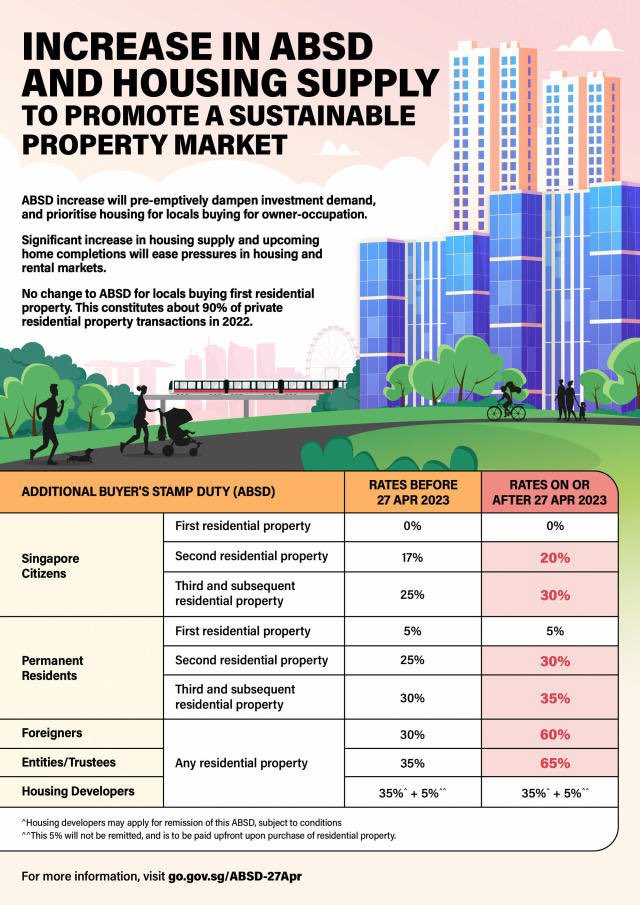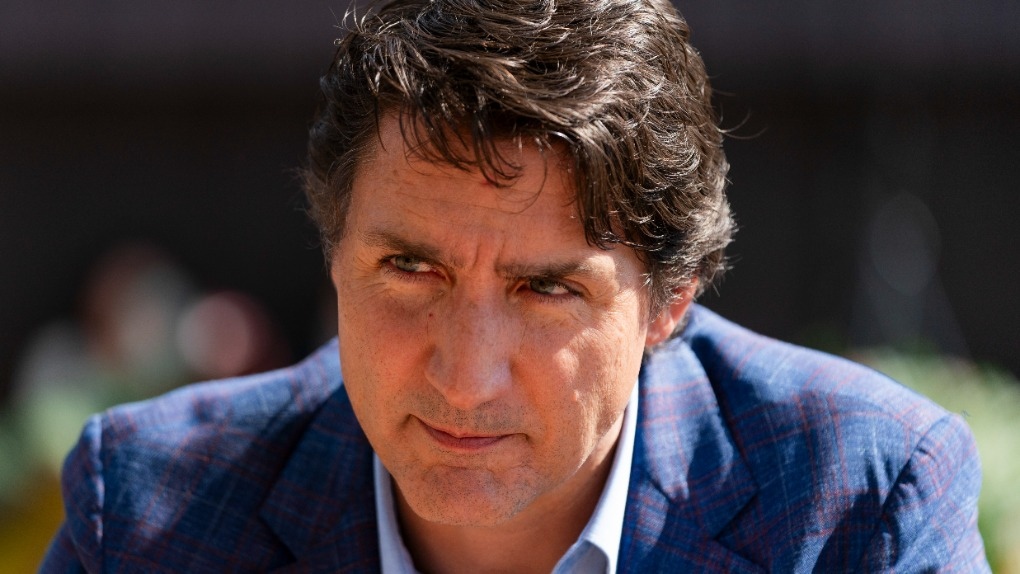The prime minister is meeting with his youth advisory board this week to hear its most ‘pressing concerns,’ with the aim of informing future policy decisions.
Implement a Singapore housing tax and you’ll get my vote:

Hey that’s not fair, it would hurt the pockets of those who own Trudeau. He means ideas that won’t amount to any change. Duh lol.
For the lazy https://www.mnd.gov.sg/newsroom/press-releases/view/measures-for-a-sustainable-property-market
Seems reasonable to me, just glad i’m not a land-lord; wish i knew what the taxes were on.
Sincere question: how would this help renters? It seems to me that this would discourage people from buying investment properties to rent out, and increase the supply available to buyers. While this would make it cheaper to buy, it seems like it would make it more expensive to rent, unless one or more of the following is true:
- A significant number of units are sitting empty, owned by speculators, rather than being rented. out (plausible, but I haven’t seen proof - is there any?)
- Landlords are colluding to keep prices high (unlikely given that there are hundreds of thousands of independent landlords per StatsCan)
- For some reason besides collusion, free-market pricing is otherwise inapplicable to rent prices (why could this be?)
If you or anyone else would kindly shed some light on this for me, I would gladly join your cause. As it stands, I’m currently more of an advocate for building public housing to increase the supply of both rental and purchase units, rather than adjusting the bias of what units we already have towards ownership over rentals.
Someone buying an investment property doesn’t increase the amount of housing available. Sure, it’s one more rental available, but it’s also one less home available to be purchased by someone planning to live in it. I won’t claim to be any kind of expert, but it’s pretty obvious that it having a middle man extracting profit increases housing costs overall.
The type of investors that do increase housing are developers. In the tax model above, the developers can apply to have the tax reduced to 5% which seems to make it much more lucrative than buying individual houses to rent as is.
If they don’t increase the amount of housing, then they don’t decrease it either, right? They effectively move a house that would be bought by a home buyer, to a house that would be rented by a renter.
I can see how given the argument that landlords generally make profit, that they are a needless middleman, and therefore they contribute to higher housing costs. Is there any evidence that this impact is so substantial that regulating independent landlords will be a boon for consumers of housing?
I appreciate you sharing your perspective! I remain open to be informed as to how such a policy would help the housing crisis.
Yes. The evidence is the housing market in 2023. Tax domestic speculators. Regulate the hell out of them. They are the main reason that everything is so screwed.
“the housing market in 2023”
Could you explain what you mean by that? I’d like to understand more but that’s a very broad statement.
Obviously the housing market is bad for buyers and renters currently. How can we differentiate between the primary cause being independent landlords, and there being insufficient supply? Both would have the effect of high prices, right? Therefore, more evidence is required to be persuasive.
Again, I remain open to being convinced, and once convinced would gladly be a staunch advocate for your position! My apologies if I’m missing something obvious. I really am sincerely trying to understand the argument for taxing independent landlords as a solution to our housing crisis.
It appears the average Singaporean home was $1.2MM in March, $1.6MM in June, and $2MM as of a week ago. I’m surprised he hasn’t adopted it already!
We need to bring back /s
Housing would be nice, but how about electoral reform?
Or, you know, fucking actually do something instead of endless committees, boards, surveys and studies. You know what you need to to:
- Build housing directly (like, employ people, buy land and buy equipment, don’t subcontract)
- Tightly regulate the market
- Tax the rich to pay for it …but you won’t do it because it would cost your donor class money.
I’m sick of this. This government didn’t need a study when they bought a pipeline for Alberta, and they didn’t need a study to buy fridges for Galen Weston. They only need studies when they don’t want to do something.
Want a model of what to do? Look at Doug Ford. That corrupt mobster-wannabee just straight up sold government land for pennies on the dollar and netted his daughter’s wedding guests billions. Did he have a committee or a study? Nope, just git’r’done.
Holy shit, you’re the goverment. You can print money. You can even claim all sorts of Keynesian multipliers as to why it’s worth doing. Just fucking do it.
deleted by creator
Ignorance isnt nearly a credible argument for a government this size and 100% looks, smells n tastes like shit to me.
Then why didn’t doug for have to use some infinite knowledge to stick his dick in our environment? I can only image the size of the environmental models and studies he went through to gsurentee the safety and wellbeing of the Canadian people right?
Or did he want another boat.
deleted by creator
I’d agree with you to a point, but I think the issue is partially technical expertise, but mostly a lack of will. Whether that’s cronyism, cowardice and/or a lack of political capital I’ll defer to insiders.
We’re into year eight of Liberals’ mandate, and they had at nearly five years unencumbered by COVID or interest-rate concerns to address an issue that economists had been red-flagging–for the GTA and GVA–since at least Martin’s government. They chose not to do anything except for some very modest controls because it wasn’t politically palatable.
Putting money back into the CMHC to build public housing at scale was always an option, it just wasn’t done. And again, it’s a matter of will; the government has shown they have the will to intervene when they want to, they just…don’t want to.
Trans-Mountain is a particularly good example of this: no one in the area wanted it, oil prices didn’t support it, the private sector wasn’t going to pony up for it (you’d think they would, if the business case was so solid), it ran directly counter to the government’s climate goals and it wasn’t going to win votes in western Canada anyway, but the government still bought it for five billion dollars. Five. Billion. Dollars.
Without particularly much in the way of committees or commissions; it took four months from announcement to completion.
Think about how much housing we could have built for five billion dollars in 2018, especially if it was done directly, instead of filtered through developers’ bank accounts. And TMX’s cost has ballooned well past that since then. Housing has been an issue for far longer, the solution isn’t nearly as controversial, and yet we have…studies.
Again, I agree with you that the government doesn’t really have the expertise to tackle the issue right now, but I do think they don’t *want * to: it’s all cost, there’s no upside (I mean, except for regular people…) and no way to make rich people richer. And I think that’s really the issue: our policymakers and bureaucrats are no longer psychologically equipped to do anything that doesn’t involve neoliberal, market-based incentivization of the wealthy. The idea of direct intervention at scale is something we can’t even conceive of.
I’m still very bitter about the broken electoral reform promise.
But pointless though aye. Kinda knows what they want yet won’t do anything since it’s costly and would likely harm his voters base.
Reminds me of the time he said he’d change First Past the Post voting and then had a committee investigate possible alternatives. After a year or two the committee presented him with their report to which he ignored entirely, changed nothing, and never talked about it again.
I get the feeling this is just to give the impression that he cares.
The difference this time is that he’s not up in the polls. So expect something completely different. Like virtue signalling.
Pretty much every politician. Ask for a report from public. Get experts in to look into options and then decide that it’s either too expensive or that it’s not viable.
Explain again what the point is in politicians. They have no discernible talents. Could save a lot of money and probably humanity if we replaced them with the experts.
Politicians seem to be middle men that add nothing to the situation and yet they muddy the waters and cost a fortune
My initial thoughts after this and their cabinet retreat are: Are they looking to do something or just looking like they’re doing something?
deleted by creator
My kids will never move out. My neighbor just built a bunkie from a kit in preparation of his kid never being able to move out in this batcrap market.
Build as much housing as you possibly can.
Now, you may be reading that as “build a lot of housing”. But that’s not what was written.
Build as much housing as you possibly can.
/RonSwanson
Seriously, if you’re not considering the feasibility of putting sheds on the moving roof of the sky dome, you’re not taking this seriously enough. If you’re not considering tearing apart a million-dollar MRI machine for scrap metal for roofing, you’re not taking this seriously enough. I want you to take the NIMBYs, flay them, tan the skins, and use them to make tents for homeless people.
It’s not an infinite number of houses.
We just need to build 3.5 million housing units by 2030. Industry is already planning 500k, so we are only short 3 million
Source: CMHC
A politician pretending to give a fuck again. What else is new?
Trudeau seeking advice from youth on how to make them shut up and stop making a fuss so he can get back to selling Canada out to his billionaire buddies.
Fixed that for you.
If you think Trudeau sells out to his rich buddies just wait until Milhouse stumbles his way into office
This is the best summary I could come up with:
The prime minister is meeting with his youth advisory board this week to hear its most “pressing concerns,” with the aim of informing future policy decisions.
It is the first in-person meeting of this cohort of the Prime Minister’s Youth Council; its new members have been in place since February of this year.
“The Youth Council plays a crucial role as a fundamental platform for the Prime Minister, Members of Parliament and senior government officials to consult and gather insights, as well as for youth to share their perspectives, priorities and ideas,” reads a government press release about the meeting.
“The Youth Council discussions are expected to offer valuable insights that will inform future policy decisions,” it also states.
He also highlighted what the government has done so far to try to address the economic challenges many young people are facing, such as offering ways to save up to buy a home and eliminating interest on student loans, but Trudeau also noted “there’s lots more to do.”
“Every time I sit down with the members of my youth council, I am endlessly inspired by their fresh ideas and perspectives,” Trudeau said in a release Monday.
The original article contains 407 words, the summary contains 195 words. Saved 52%. I’m a bot and I’m open source!
Electoral reform should be number one priority. Once that’s fixed then housing as electoral reform would help resolve a lot of this issues in our current system.
A combination of a few million new high density housing over the next decade, a complete rewrite of zoning laws to take them outside of the hands of the cities, and the removal of any need of any neighbourhood association to sign off on any new development.
Commercial producers won’t make housing cheap and affordable on their own in any reasonable time-frame. Even if they instantly become able to construct as they like, market forces will take time to let housing prices cool off.
Which goes into my second point, zoning laws as they exist prevent housing from being made in the first place. Especially single family house zones are the single biggest killer of affordable housing. People already make their houses massive, to the point that they’re getting close to low-rise apartments.
Which goes to the third point: the character of a neighbourhood changes every single day, so any attempt at the preservation of such a thing is just a bald faced lie, even if they’re lying to themselves saying it. The neighbourhood I grew up in were all small houses, from tiny two stories to bungalows. Every single house is easily twice if not three times bigger than the ones I remember as a child. There’s no trace of the neighbourhood I grew up in, aside from the fact that they don’t house any more families than before. Hell, they probably house fewer people than before as I bet almost all the families there have only one child at most.
The unfortunate result if there was actually the political will to do this is that it would cause a pretty big depression as people have been conditioned into treating housing as an investment for their retirement. A necessity of modern life being used to create profit, that in itself is a non-performing asset that adds exactly zero dollars to the economy and is worse than buying a whole bunch of gold ingots in the hopes that its value will rise faster than inflation.
Personally, I’m patient so I’m fine with house prices going down slowly, as long as rentals get cheaper. It’s stupid when such a high number of young decide that they’re pushing off moving out of their homes due to seeing it impossible to afford one of their own. Delaying getting a home, even an apartment, means delaying getting married, presuming you’re even bothering to date. Delayed marriages means fewer children, which means a stagnating and eventually dwindling population.
If the population stagnates, then everything falls apart for the elderly as the price of everything goes up as there’s fewer people to make, deliver, and serve everyday items. And that’s not to mention that the entire RRSP system depends on sufficient new blood putting money into it just to maintain the status quo. Lots of retirees all over the world are going back to work only because inflation has gone up a bit. How many will do so when it becomes impossible to keep inflation in the most critical areas down due to the lack of workers?
In the end, housing is the root problem, and while I fear it causing a major recession, I still think it’s preferable than for housing prices to never come down. The economy will tank in the future whether the housing bubble bursts or keeps its course. But only one of those two options gives us a hopeful future beyond that bleak one.
Why does he look like Tucker Carlson here?
deleted by creator
deleted by creator
More bullshit from the idiot in charge. Anything a liberal/NDP/pc is usually worth chicken shit to the general public.








